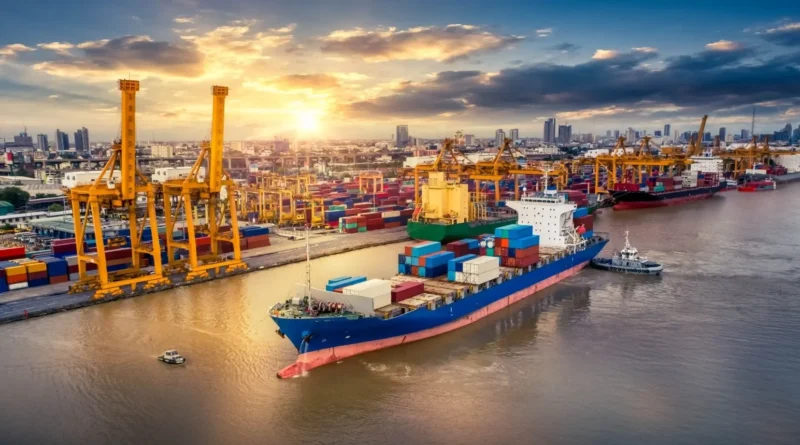Shipping from Dubai to World
Dubai is a global shipping hub that bridges East and West, with a strategic location, world-class ports, and streamlined logistics services. Businesses and individuals shipping from Dubai have a range of options that cater to international cargo needs, including air, sea, and land freight. In this guide, we’ll cover everything you need to know about shipping from Dubai, from choosing the right shipping method to understanding customs requirements and finding reliable shipping partners like Alliance Shipping.
1. Why Dubai is a Strategic Shipping Hub
Dubai’s position as a global logistics hub is supported by several factors:
- Geographic Location: Situated between Europe, Asia, and Africa, Dubai offers quick access to major international markets.
- Infrastructure: The city boasts state-of-the-art seaports, including Jebel Ali Port, one of the world’s busiest.
- Free Zones: The UAE’s numerous free zones, including Dubai’s Jebel Ali Free Zone (JAFZA), offer tax incentives and streamlined customs processes.
Alliance Shipping capitalizes on these advantages by providing comprehensive shipping services that help businesses reach markets worldwide quickly and efficiently.
2. Shipping Options from Dubai
Businesses can choose from three main shipping methods when shipping goods internationally from Dubai:
- Ocean Freight: Ideal for bulk and oversized shipments, ocean freight is cost-effective for large volumes.
- Air Freight: The fastest option, air freight is suited for urgent or high-value shipments.
- Land Freight: Suitable for shipping within the GCC region or to nearby countries like Saudi Arabia and Oman.
Each shipping option has unique advantages. For example, Alliance Shipping offers both Full Container Load (FCL) and Less than Container Load (LCL) services for flexible ocean freight solutions.
3. Understanding Dubai’s Export Documentation Requirements
Proper documentation is crucial to ensure smooth customs clearance. Common export documents from Dubai include:
- Commercial Invoice: Details the goods being shipped and their value.
- Certificate of Origin: Verifies the origin of the goods, which is necessary for certain countries.
- Bill of Lading (BOL): A contract between the shipper and carrier, outlining the details of the shipment.
- Packing List: Provides information on the cargo’s contents, dimensions, and packaging.
Alliance Shipping assists clients in preparing all required documentation, reducing the risk of delays and ensuring compliance with international trade regulations.
4. Key Destinations for Shipping from Dubai
Dubai’s central location supports shipping to several high-demand destinations around the world. Here are some of the top markets for exports:
- Europe: European countries, especially the UK and Germany, import goods from Dubai, benefiting from efficient transit times via air and sea.
- Asia: China, India, and other Asian markets have strong trade links with Dubai.
- Africa: Dubai serves as a major gateway for goods moving to East and West Africa.
- North America: While ocean freight takes longer, air freight services to North America are fast and reliable.
Alliance Shipping regularly ships to these regions, offering customized solutions for each market to ensure timely and cost-effective deliveries.
5. Choosing the Right Freight Forwarder
Partnering with a reliable freight forwarder is essential for successful international shipping. Key factors to consider when selecting a freight forwarder include:
- Global Network: A wide network ensures coverage across multiple countries and regions.
- Experience and Expertise: An experienced forwarder like Alliance Shipping understands the complexities of international shipping and offers tailored solutions.
- Customer Support: Reliable customer service can help resolve issues quickly and provide valuable updates on shipment status.
Alliance Shipping offers a strong global network, industry expertise, and dedicated support, making them a trusted choice for shipping from Dubai to the world.
6. Tips for Reducing Shipping Costs
To control costs while maintaining quality, consider these cost-saving tips:
- Consolidate Shipments: For smaller shipments, consolidating with other cargo can reduce expenses.
- Optimize Packaging: Choosing compact, lightweight packaging minimizes dimensional weight, especially for air freight.
- Plan Shipping Schedules: Avoid peak shipping seasons if possible, as rates may increase due to high demand.
Alliance Shipping provides options like LCL consolidation and offers consultation on packaging best practices, helping clients save on shipping costs.
7. Understanding Customs and Duties for International Shipping
Every country has its own customs regulations and import duties. Being aware of these policies ensures a smooth shipping experience. Important points include:
- Customs Clearance Process: Submit accurate and complete documentation to avoid delays.
- Import Duties and Taxes: Research destination country tariffs, as these may vary widely based on product type.
- Restricted and Prohibited Items: Verify any restrictions on the goods being shipped to avoid compliance issues.
Alliance Shipping helps clients navigate the customs process, providing insights into country-specific requirements and assisting with clearance procedures.
8. Tracking and Managing International Shipments
Effective tracking is vital to ensure cargo arrives on schedule. Advanced tracking technology offers real-time updates, allowing businesses to monitor the entire shipping process.
- Tracking Platforms: Use online portals or apps to track shipments in real time.
- Automated Alerts: Set up notifications for important events, such as departure, arrival, and delivery.
- Logistics Software Integration: Many businesses integrate tracking into their logistics systems for comprehensive oversight.
Alliance Shipping utilizes cutting-edge tracking technology, offering clients full visibility on their shipments from Dubai to the destination, enhancing reliability and customer satisfaction.
9. Handling Hazardous and Specialized Cargo
Shipping hazardous or specialized goods requires additional precautions, especially for international transit. Businesses shipping from Dubai should be aware of the following:
- Classification and Documentation: Properly classify hazardous materials and obtain the necessary permits.
- Safety Standards: Follow international standards for packaging, handling, and labeling.
- Carrier Selection: Choose a carrier experienced in transporting hazardous goods.
Alliance Shipping has expertise in managing dangerous and hazardous goods, ensuring compliance with safety regulations and providing secure transportation.
10. The Importance of Insurance for International Shipments
Shipping insurance protects businesses from losses due to damage, loss, or theft during transit. While some carriers offer basic liability coverage, full insurance is recommended for high-value shipments.
- Types of Coverage: Choose from options like full coverage, partial coverage, or liability insurance.
- Risk Assessment: Assess the likelihood of risks based on the route and shipment type.
- Insurance Providers: Partner with reputable insurance providers for maximum protection.
Alliance Shipping can assist in arranging comprehensive insurance options, helping businesses protect their shipments from Dubai to global destinations.
Conclusion
Shipping from Dubai to international destinations is both accessible and efficient with the right guidance and logistics partner. From selecting the best shipping method to understanding customs and reducing costs, this guide provides a roadmap for successful global shipping. Working with a trusted partner like Alliance Shipping ensures smooth, cost-effective, and reliable logistics solutions that meet the unique needs of businesses operating from Dubai. Whether shipping to Europe, Asia, Africa, or the Americas, Alliance Shipping’s extensive network, advanced technology, and expert support are here to help your business thrive in international markets.
to read more informative blog please visit: Connect Publish


